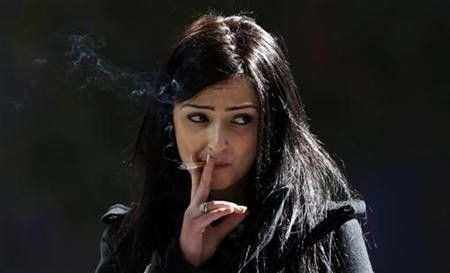California Primary Vote Might Be A Nightmare For Big Tobacco

For every dollar California expects to raise from a proposed tax hike on cigarettes, Big Tobacco has spent about six cents to stop it.
Among the candidates on Tuesday's California primary ballot, voters will also find an initiative that would raise cigarette taxes by $1 a pack to fund cancer research. Governor Jerry Brown promises the tax would raise an estimated $735 million, the Boston Globe reports. Tobacco companies are behind a $47 million advertising campaign to stop the tax hike from passing.
California has already established a reputation as one of the most anti-smoking states in the country, with some of the harshest anti-smoking laws and aggressive education efforts. According to an August report detailed in the Los Angeles Times, California has the second-lowest percentage of smokers in the country (11.9%) -- only Utah had a lower smoking rate last year (9.1%).
While Californians still support Proposition 29 as a majority, a Public Policy Institute of California poll found that support dropped from 67 percent in March to 53 percent in May, since the ad campaign began, the Globe reported.
The proposal has attracted the likes of public health champion Mayor Michael Bloomberg, who contributed $500,000 to the campaign. New York City banned smoking in restaurants and bars in 2002 and in public parks and beaches in 2011, and Bloomberg has proposed a ban on the sale of large sodas and sugary drinks in most businesses. Bicycling champion Lance Armstrong, a cancer survivor, has also taken part in a public relations initiative to pass the tax hike.
But even if the California tax hike were to pass, it would serve more as a public health initiative than something to help the state's struggling finances.
Over a year after Brown took over the reins from Arnold Schwarzenegger, the state's budget deficit has skyrocketed to a projected $16 billion from $9 billion last month. Brown has said schools and public safety could suffer severe cuts if voters don't approve tax increases in November. The governor even recently took a pay cut.
California has been a traditionally Democratic state in the general presidential election and recently redrawn districts tend to work in the favor of more moderate candidates, according the Associated Press. But Republicans are hoping that voter dissatisfaction over how the state's finances are being handled will help elect GOP candidates for Assembly Senate, Congress and U.S. Senate.
© Copyright IBTimes 2025. All rights reserved.





















